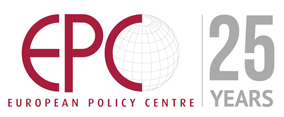(November 6, 2023 – EPC, European Policy Center)
Speakers:
- Daniela Schwarzer, Member of the Executive Board, Bertelsmann Stiftung / Co-Rapporteur of the Franco-German Working Group on EU Reform and Enlargement;
- Guy Verhofstadt, Member of Parliament, Renew Group;
- Janis Emmanouilidis, Deputy Chief Executive & Director of Studies, European Policy Centre.
Moderator:
- Jacki Davis, Senior Adviser, European Policy Centre.
The recent ‘EUrope Reimagined’ conference sparked intense discussions on the imperative need for reform within the European Union and emphasized the urgency of reforming in the face of global conflicts, such as the Russian invasion of Ukraine. The discussion primarily revolved around the ambitious reforms required to make the EU more effective, democratic, and ready for the challenges ahead.
Why reform the EU?
The escalating global conflicts and the prospect of EU enlargement to potentially thirty-four, thirty-five or even thirty-six member states highlight the pressing need for reform. The inadequacies of the current governance structure, marked by unanimity requirements, hinder efficient decision-making, as evident in issues like foreign policy sanctions and some elements of migration. Guy Verhofstadt stressed that “already with twenty-seven, it is nearly impossible to take decisions in a number of areas – we see that for example in the whole question on sanctions for example to Russia: the impossibility of the Union, now, to decide on a twelfth sanctions package” that has already been on the table for months. On the other hand, he highlighted that there are problems inside the member states, and it has been difficult to “push them in the right direction”, because it is not easy “to sanction them in a convincing way”.
Ambitious reform vs. pragmatism
The conference debates were characterized by a push for ambitious reform rather than pragmatic solutions. The prevailing governance model’s limitations demand a substantial overhaul to navigate potential enlargement effectively.
Guy Verhofstadt called the attention to a typical example of a pragmatic instrument that is called in EU Treaties the passerelle clause. While there is the option to transition from unanimity to a qualified majority, it has never been exercised. According to Mr. Verhofstadt, it is unlikely to ever be used due to the requirement for unanimous agreement. The reluctance stems from the fact that smaller and medium-sized countries are unlikely to consent. The reason for their hesitation lies in the shift to qualified majority voting, where voting power is proportionate to a country’s size and population. Essentially, this means a potential unequal distribution of power, with smaller countries being hesitant to agree as it could result in giving more voting influence to larger nations like France and Germany.
Janis Emmanouilidis drew attention to a subject that had been discussed some years ago, that was “the need to be pragmatically ambitious or ambitiously pragmatic”. In his opinion, the EU needs to be more ambitious because the world is changing, not only because of the aggression against Ukraine, but also the situation in the Middle East. So, for Mr. Emmanouilidis the need for reform is obvious, and the only remaining question is “how far we will go”. He added that “we need to push in terms of not wasting time”.
Key areas to overhaul:
- Governance Restructuring: Transitioning from unanimity to a two-thirds majority in critical decisions to enhance efficiency.
- Rule of Law Protection: Strengthening mechanisms to protect the rule of law within the EU through changes in Article 7.
- Differentiation: Allowing smaller groups to act independently on specific policies, with provisions for exclusion and qualified majority voting.
Perspectives on reform
Guy Verhofstadt emphasized the impossibility of continuing with the current governance in the face of global challenges. Ambitious reforms are seen as necessary to address decision-making inefficiencies and prepare for potential enlargement.
The Franco-German report
Daniela Schwarzer highlighted the significance of the Franco-German report aligning with the need for ambitious reforms. (See our earlier analysis on the matter!) Proposals include changes in Article 7, rule of law protection and differentiation strategies. The report emphasizes the necessity of EU reform before pursuing enlargement.
Guy Verhofstadt stressed that the changes proposed to the treaties aim to establish new competences, notably a Health Union and a European Defense Union. According to him, this is essential, because the EU currently expends a significant amount on defense, comparable to China’s total expenditure. However, despite this substantial investment, the EU falls short, managing only about 10% of the operations carried out by the United States military.
Challenges and next steps
Speakers acknowledged the challenges posed by evolving global context and emphasized the need for swift action. Reforming the EU involves a delicate balance between ambition and pragmatism. The proposed changes, ranging from governance restructuring to rule-of-law protection, offer a roadmap for a more cohesive and adaptable EU.
Daniela Schwarzer mentioned the debate over whether to pursue a treaty reform or to “twist and tweak a little within the existing treaty framework” and she drew attention to the risks associated with ratifying treaty changes. However, she offered a compelling comparison with the risks tied to enlargement. Ms. Schwarzer suggested that there is substantial room for action in collaboration with accession countries even before they attain full membership. She emphasized that a crucial measure could be the extension of EU policies, particularly in areas such as economic stabilization and cohesion. Importantly, she underscored the need to contemplate how the EU can actively involve accession countries in the decision-making process.
The ‘Europe Reimagined’ conference provided critical insights into the imperative for ambitious reforms within the EU. The proposed changes aim to address governance deficiencies, fortify the EU’s ability to respond to global challenges, and set the stage for potential enlargement. The challenge now lies in translating these discussions into actionable reform, ensuring that the EU remains relevant and effective in an ever-evolving global context. The road ahead involves navigating the complexities of EU decision-making and building consensus for substantial reforms.

